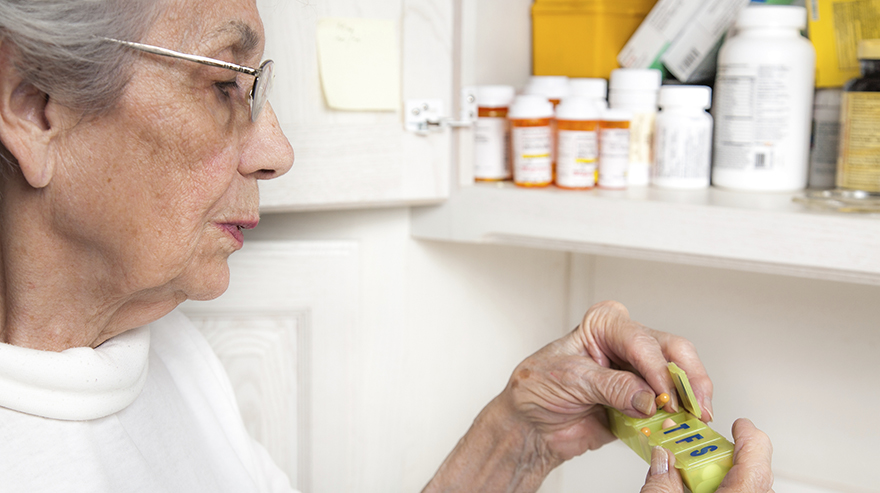Will getting organized help increase longevity? It makes sense to say yes; because it puts you under less stress, reduces the frustration of continually having to search for things in your home, and reduces accidents by having everything in its place. One study even found that people who worked in a neat space tended to have healthier snacks during the day than those who lived or worked in a messy work space.
As an octogenarian, I find that my body doesn’t always keep up with my mind and I have to make certain adjustments. Although we may hate to admit it, we become frailer and more susceptible to falls the older we get. The National Center for Injury Control & Prevention reports that over one third of people 65 and over suffer falls and related injuries. Our bones are usually more brittle. So keep both home and office relatively clutter-free. Avoid placing furniture or other obstacles in high-traffic areas. Don’t wear hard-soled shoes and avoid having loose throw rugs on the floor. You might consider balance training as well.
The best advice I can give is to recognize that as you age, your body and mind change, and you have to pay more attention to organizing your environment and yourself as you may have done in the past.
According to Home Safety Council statistics, older adults in the U.S. experience more than 2.3 million home injuries each year. The most dangerous rooms in any home are the bathroom and the kitchen – mainly due to trips and falls. So install grip bars. And remember that bathroom rugs are dangerous.
Pets in the home can also be a hazard as well as a help. Large dogs can push you off balance and small dogs and cats can trip you up. Cats and dogs are blamed for 86,000 annual falling injuries that send humans to the emergency room, according to the Centre for Disease Control & Prevention. Dogs cause seven times more injuries than cats. So be aware of where your pet is at all times.
The major causes of fires in the home include leaving on a curling iron or heating blanket or an electric heater too close to flammable material – or an unattended kitchen burner or stove. I think it would be a good idea to have a checklist to go over each night before retiring – such as pull the plug on electric heater, turn on nightlights, lock door, etc. I’m a great believer in checklists.
Seniors should definitely keep a checklist for all the prescription and over-the-counter medications they take. Include supplements and vitamins. For each medicine, mark the correct name of the drug, the amount you take, the time of day you take it, and whether it should be taken with food. Store two copies of the list: one on the refrigerator door or where your medications are stored, and one in your wallet or purse. Drugs frequently get mixed up because many of them look alike and even the names sound the same.
Some people are notorious for keeping old medications. Periodically organize your medicine cabinet and toss out all the expired and unused stuff. You should store things in the room they are used. For medications, that could be the kitchen. Highlight the expiry date on all your medications. Use pill containers that have separate compartments for morning, afternoon and evening, and fill them with your week’s medications every weekend. I have one that holds enough medication for an entire month and it’s convenient when taking vacations.
Before heading to the runway for takeoff, pilots must complete a procedural checklist to assure the aircraft is ready for flight. Now many hospitals require surgeons to complete a similar checklist before doing even the most minor procedures — including, to the amusement of some, confirming which limb or organ is to be operated upon. While it seems silly, it’s not — it’s a way to be assured that every possible step is being taken to assure patient safety. Research is demonstrating that when hospitals adopt this practice, there is a measurable improvement in outcome. A study published in the New England Journal of Medicine found a reduction in both deaths and complications when hospitals used a 19-item surgical safety checklist.
It makes sense that if individuals establish a structure with routine procedures for health-related matters, it would not only reduce stress, but also help lower the risk of at-home medication mistakes and other mishaps that can have serious consequences. Many people put themselves at risk because they are haphazard about letting important papers pile up or, equally problematic, throwing out things they should keep for future reference. Keep a copy of all medical records in a clearly marked folder. Make it a habit to request copies of all test results, X-Rays, and treatments.
As Leonardo da Vinci has been quoted as saying, “Time stays long enough for anyone who will use it.” To that I would add, “and who will manage it with care.”
Note: The above article was taken from the book. “How to grow older without growing old,” by Harold L Taylor, Taylorintime.com, 2018. 147 pages. Available in both paperback (Perfect bound, 8 ½ X 11 format, and electronic format.)


Just glanced through the book How to Grow Older Without Growing Old that you graciously gave to my husband this morning at Tim’s Hortons. What a great source of information for us growing older people. Thanks, I will read through it and hopefully he will as well. Thank you as I will keep it in sight of our company.